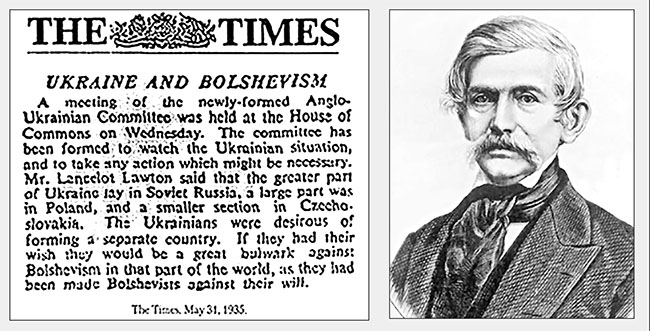Europe’s destiny being decided in… Donbas
Why British academic Lancelot Lawton is still of importance
Many decisions are taken in the West on the basis of how they understand Ukraine. That is, much depends on how well our country is able to convey information and knowledge about itself to our Western partners, and there are well-known shortcomings there. For example, there has been little progress in recent years on issues including opening Ukrainian centers abroad, launching an English-language TV channel, distribution of books and films, establishing close cultural ties, etc. The problem is not even our lack of products to offer, but rather a lack of desire to do it. Our newspaper has run Den’s Library project since 2002. Each year, this newspaper, using its own funds, prepares and publishes books on the history of Ukraine, both ancient and modern, with 150,000 copies having been produced over these years. Some publications have even been translated into English (Ukraine Incognita. TOP 25, Day and Eternity of James Mace, and A Case without a Statute of Limitations). But even when it gets this finished product, our government is not ready to pick it up, negotiate, and convey it. For example, to get the books bought by the Verkhovna Rada library (not to mention the foreign countries), we needed to conduct a veritable ‘special operation’ involving two chairs of parliamentary committees.
On the other hand, some reciprocal movement ought to be there. The West needs to take more interest in Ukraine, which acts as the vanguard in the confrontation with the Russian aggressor. The front line runs through it. This is not a buffer zone which is located somewhere far away. This is a nation that fights for the right to exist and its identity, and for the values professed by the West. Seventy-eight years ago to the day, on February 1, 1939, British scholar of Ukraine Lancelot Lawton delivered at a meeting of the Near and Middle East Association in London a still relevant report, entitled Ukraina: Europe’s Greatest Problem, which said, in particular: “Within the past few months, Ukraina, a nation unknown to the West, has come into the forefront of the world’s attention. Most people, I think, are prepared to say that they know little or nothing about it. For this deficiency in knowledge they need not blame themselves. There are good reasons for it. The suppressors of Ukraina took care that she be unknown; they indeed denied that she even existed. It would be difficult to imagine anything more reprehensible than this silencing of a nation which by ancient right belongs to the European family of nations. In spite of the widespread and forgiveable ignorance which exists on the subject, the impression widely prevails that upon the solution of the Ukrainian problem will depend the fate of Europe. This impression is justified.”

It looks like Europeans did not understand the importance of independent Ukraine then, just like during the Ukrainian Revolution of 1917-21. But do Europeans and Americans understand it today? After all, Russia has been doing everything to mislead the world about its actions in Ukraine. The Kremlin is much more professional than us in its efforts in the West, even though we should admit that it has much greater resources at its disposal, and it is trying to impose its parallel reality on others. Look, for instance, at a recent statement by the Russian president’s press secretary Dmitry Peskov: “As for the current aggravation at the engagement line, this is, perhaps, another reason for the quickest resumption of a dialog and cooperation between Russia and America, including in the interests of solving the Ukrainian crisis.”
Consequently, it may well be that the Kremlin committed new crimes in the Donbas to induce the West, and especially the new US administration, to negotiate and divide spheres of influence. And, of course, negotiate the lifting of sanctions as well. In response, the Ukrainian government should mobilize all forces, knowledge, and resources of the country to not only hold fast on the line of contact and kick the aggressor in the teeth, but also to go on the offensive on the diplomatic, information, and cultural fronts.
Newspaper output №:
№7, (2017)Section
Day After Day





